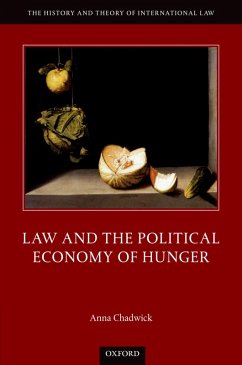This book is an inquiry into the role of law in the contemporary political economy of hunger. In the work of many international institutions, governments, and NGOs, law is represented as a solution to the persistence of hunger. This presentation is evident in the efforts to realize a human right to adequate food, as well as in the positioning of law, in the form of regulation, as a tool to protect society from 'unruly' markets. In this monograph, Anna Chadwick draws on theoretical work from a range of disciplines to challenge accounts that portray law's role in the context of hunger as exclusively remedial. The book takes as its starting point claims that financial traders 'caused' the 2007-8 global food crisis by speculating in financial instruments linked to the prices of staple grains. The introduction of new regulations to curb the 'excesses' of the financial sector in order to protect the food insecure reinforces the dominant perception that law can solve the problem. Chadwick investigates a number of different legal regimes spanning public international law, international economic law, transnational governance, private law, and human rights law to gather evidence for a counterclaim: law is part of the problem. The character of the contemporary global food system-a food system that is being progressively 'financialized'-owes everything to law. If world hunger is to be eradicated, Chadwick argues, then greater attention needs to be paid to how different legal regimes operate to consistently privilege the interests of the wealthy few over the needs of poor and the hungry.
Dieser Download kann aus rechtlichen Gründen nur mit Rechnungsadresse in A, B, BG, CY, CZ, D, DK, EW, E, FIN, F, GR, HR, H, IRL, I, LT, L, LR, M, NL, PL, P, R, S, SLO, SK ausgeliefert werden.


